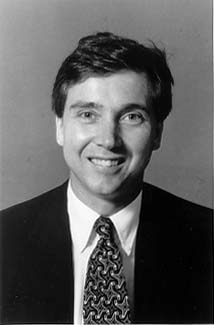
Big, Beautiful Sky: The State and Future of Texas’ Air
SEPTEMBER 5, 2003
Dr. David Allen
Director, Center for Energy and Environmental Resources
The University of Texas at Austin
What is the talk about?
We’re all affected by air quality in Texas. Whether it’s because of the concentration of pollutants in the air we breathe or whether it’s because of our appreciation of beautiful Texas sunsets, we all have a stake in preserving air quality. This presentation will describe the air quality issues facing Texas, especially in Houston and Austin, and will describe what we know and what we need to know in order to preserve air quality in Texas. The two cities of Austin and Houston provide many insights into the formation of air pollution and how local and regional sources are both important contributing sources. A major source of air pollution in Texas, ozone, is not emitted directly but is the result of a chemical process involving a variety of emitted compounds and atmospheric conditions. Emission inventories help scientists, regulators, and the public understand what activities are the major sources of the emissions that eventually result in ozone and thus help us to identify what can be done to lower ozone levels. Many Texas cities will exceed future more stringent air quality standards. Scientists need to be able to model air pollution formation and understand not only atmospheric chemistry but also weather patterns and meteorology as factors such as wind patterns can have dramatic impacts on air quality in a given location in different years even if the emissions in the area and the region have remained the same. This talk will provide insights into the formation of air pollution, the importance of atmospheric chemistry andmeteorology for air pollution levels, and how scientists model and understand what causes air pollution and what can be done about it.
About our presenter

Dr. David Allen
Dr. David Allen is the Melvin H. Gertz Regents Chair in Chemical Engineering and the Director of the Center for Energy and Environmental Resources at the University of Texas at Austin. Dr. Allen’s research addresses issues related to air quality in Texas. He was a lead investigator in one of the largest and most successful air quality studies ever undertaken: the Texas Air Quality Study (www.utexas.edu/research/ceer/texaqs). His current work is focused on using the results from that study to provide a sound scientific basis for air quality management in Texas. Dr. Allen also serves as the Chair of the Texas Council on Environmental Technology (TCET), which was established by the 77th Legislature. TCET is charged with encouraging the development, demonstration, certification and deployment of novel technologies for cost-effectively reducing emissions to air, water and land in Texas. At the national level, Dr. Allen serves on the Science Advisory Board of the EPA, dealing with issues of air quality modeling and cost-benefit analysis of the Clean Air Act. He also serves on the National Research Council’s Board on Environmental Studies and Toxicology. Dr. Allen received his B.S. degree in Chemical Engineering, with distinction, from Cornell University in 1979. His M.S. and Ph.D. degrees in Chemical Engineering were awarded by the California Institute of Technology in 1981 and 1983. He is the author of 4 books and more than 150 technical papers. He has held faculty appointments at UCLA and the California Institute of Technology; he joined the University of Texas in 1995.
Videos & Podcasts
Presentations
Learning Modules
- Part 5 - Teacher Notes
- Part 4 - Atmospheric Chemistry
- Part 3 - Tale of Two Cities - Houston
- Part 2 - Tale of Two Cities
- Part 1 - Big Sky